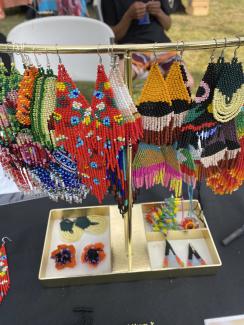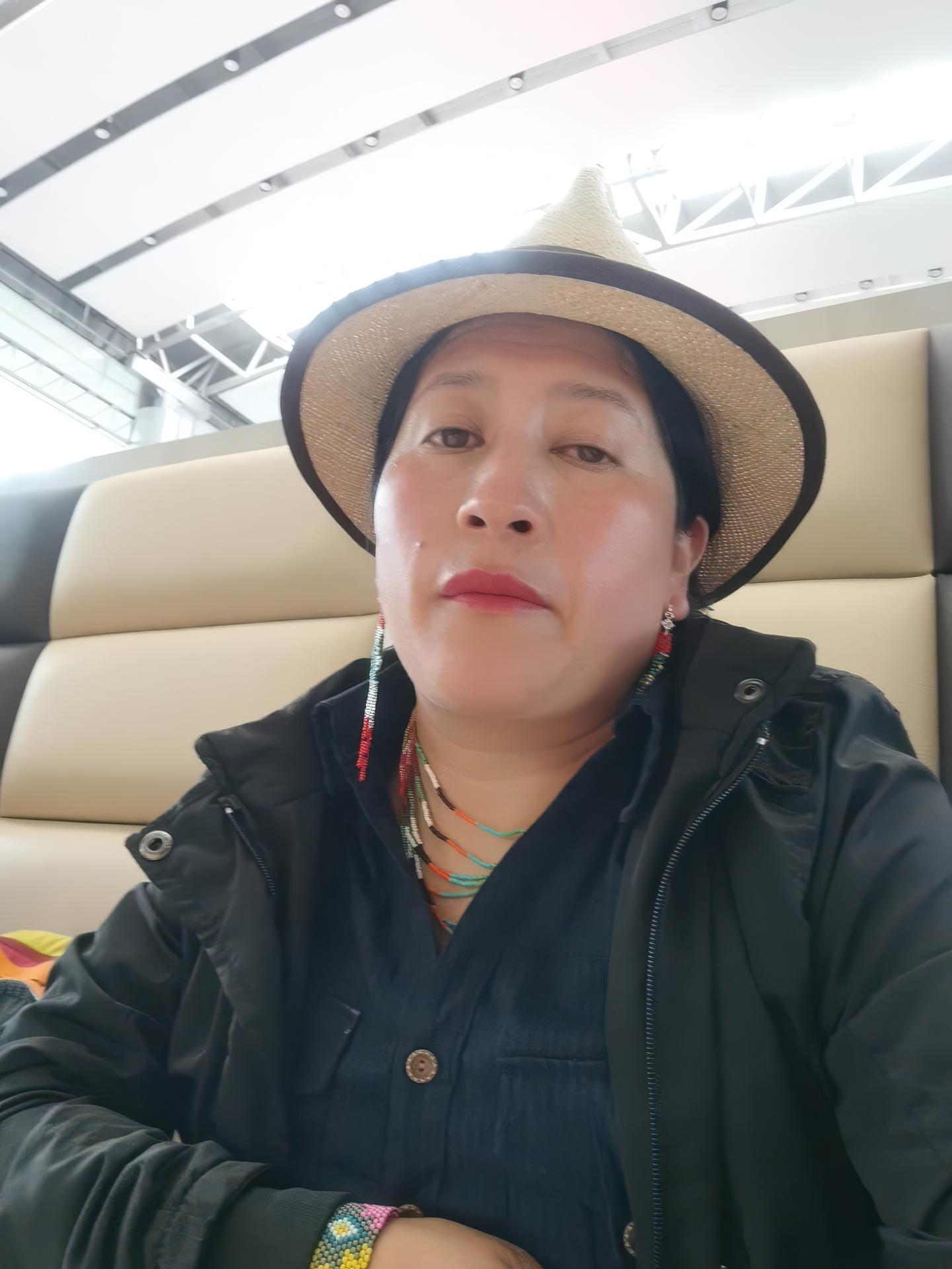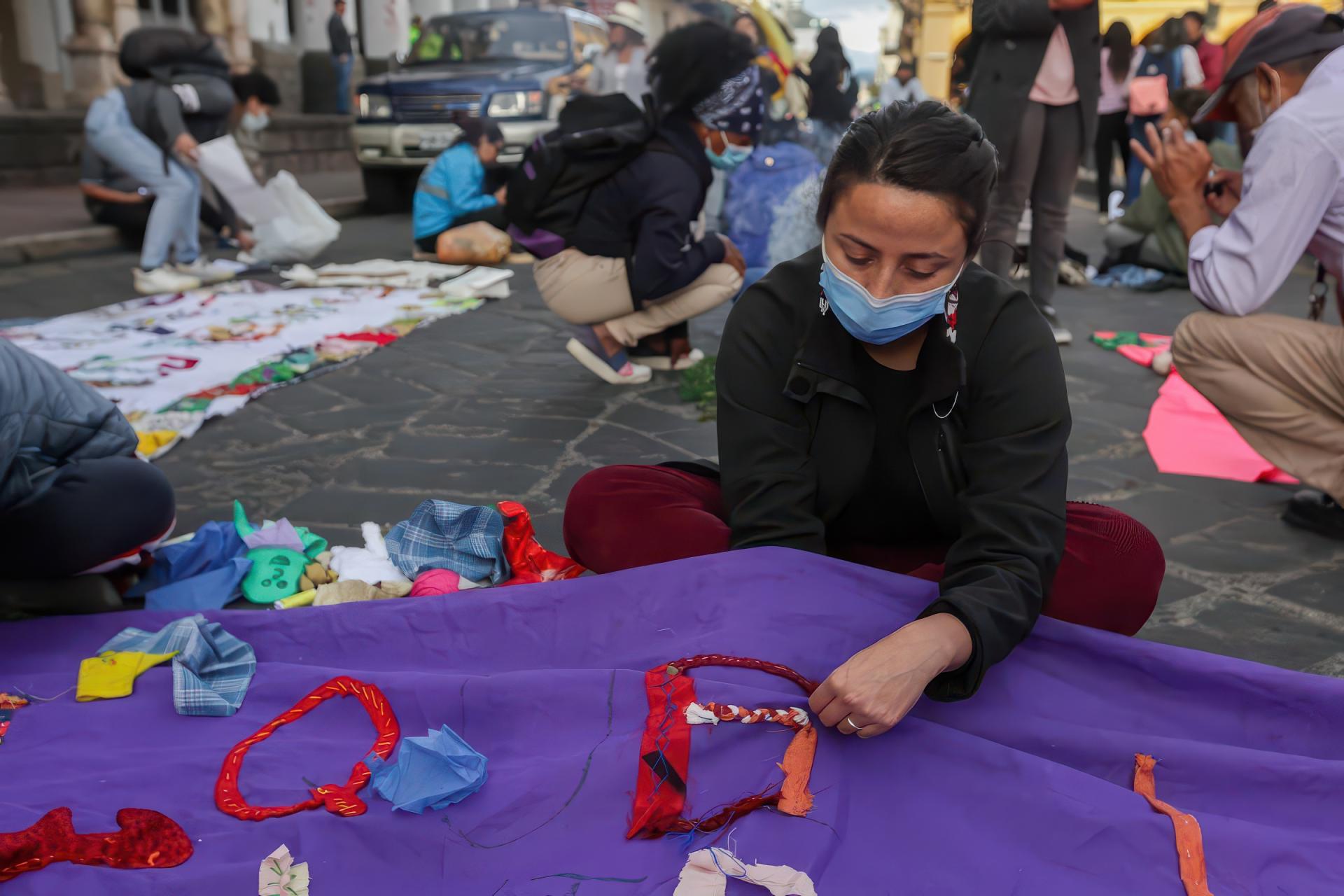
Elizabeth Durazno (Kichwa Cañari), an artisan from Río Blanco, Molleturo parish in Ecuador, is an active force in the Warmi Muyu Collective. Through her art, Durazno challenges the forces threatening her community’s culture, land, and future. As a creator and advocate, she uses weaving as a medium for both expression and resistance, blending traditional techniques with a commitment to sustainability and cultural strengthening.
Durazno’s work isn’t just about crafting jewelry or textiles; it’s about weaving resilience. Each piece, from woven purses to ceremonial necklaces, carries deep spiritual meaning and reflects a culture deeply connected to the land. Her creations are more than beautiful objects: they are declarations of cultural survival in the face of colonialism, environmental degradation, and the commodification of Indigenous identity.
Durazno’s artistic process begins with a deep connection to the land and represents a blending of Traditional Knowledge and modern living, where the bounty of nature is connected with the needs of contemporary life. “Our process is to collect seeds or fibers, which we call the threads of the territories,” she explains. “We mix them with those from the territory and the city, because there are things that can’t be found in the fields.”

Elizabeth Durazno.
Using sacred materials like wool, jute, and the cabuya plant, Durazno’s creations reflect the Andean landscape. “We give each product a name. We think about nature and we are making the product identified with each plant,” she says. Every item is a living embodiment of her People’s connection to the earth.
For Durazno, art is not just creation, it is a form of resistance. Her community faces severe threats from the expansion of mining in Ecuador’s Azuay province, which has devastated ecosystems and contaminated water sources. “My community is located south of the city of Cuenca in the Azuay province of Ecuador. It’s directly in the Páramo, which is home to wetland ecosystems and bio-diversity,” she explains. “However, there’s also already some impact, because the mining project was located there. Our community was destroyed, as were the ecosystems, with significant loss of water sources.”
In response, Durazno and the Warmi Muyu Collective created their Defense and Conservation project, which not only involves art, but also land-based work such as reforestation and sustainable living practices. “We didn’t just want to say no to mining extractivism. We wanted to present an alternative,” she says. This effort aims to reconnect with their land, protect its resources, and create a vision for the future rooted in respect for the environment.

The Warmi Muyu Collective, founded in 2018, a project of Sinchi Warmi, reflects Durazno’s commitment to community empowerment. Despite initial challenges, the collective flourished, fueled by the collective will of the women who planted the seeds of their future. Warmi Muyu is a combination of warmi (woman) and muyu (seed), signifying the collective’s commitment to nurturing culture. Women are the foundation of the collective, ensuring that the work reflects not just creativity, but resilience. Their catalog, “Mujer Páramo,” is not just a collection of art—it is a manifesto asserting that women are the guardians of the land and its future.
Durazno’s participation in the Cultural Survival Bazaar gives the Warmi Muyu Collective visibility. But for her, the Bazaar is more than just an opportunity for recognition. It is also a place to connect with artisans from over 50 countries. “It’s not just a market; it’s a space to share strategies, raise awareness, and speak directly with community creators and advocates,” she says.
Through the seeds she pierces and the fibers she twists, Durazno is weaving far more than earrings and bags. She is weaving resistance, memory, and a future where Indigenous women and their communities are empowered through culture, not erased by extractivism. “When we create, we are not just making a product,” she says. “We are telling the story of our ancestors, our land, and our future. We are weaving a tapestry of resistance, love, and hope.” Durazno and the Warmi Muyu Collective represent a vision where art, culture, and environmental justice go hand in hand.
Join us at the Cultural Survival Bazaars on December 13-14, 2025: Cyclorama, Boston, MA, and December 20–21, 2025: WaterFire Arts Center, Providence, RI. bazaar.cs.org
